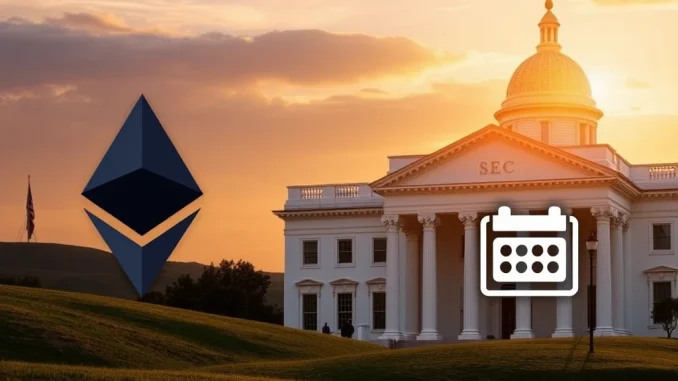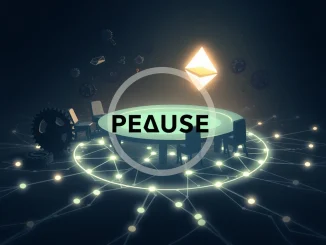
If you’re following the cryptocurrency market, especially developments around institutional investment products, you’ve likely been keeping a close eye on the various spot Ethereum ETF applications in the United States. A significant piece of Ethereum ETF news recently emerged concerning the Grayscale ETH ETF application, specifically regarding its proposal to include staking.
What is the Latest on the SEC Ethereum ETF Review?
The U.S. Securities and Exchange Commission (SEC) has once again pushed back its deadline to decide on whether to approve a rule change that would allow Grayscale Investments to offer a spot Ethereum exchange-traded fund (ETF) that incorporates staking. This particular filing is for the Grayscale Ethereum Trust (ETHE), seeking to convert it into a spot ETF, similar to what Grayscale successfully did with its Bitcoin Trust.
The crucial element here is the request to include Spot ETH ETF staking capabilities within the fund structure. Staking Ethereum allows holders to earn rewards by participating in the network’s validation process. Including this feature in an ETF could potentially offer investors an additional yield component, making the investment product more attractive compared to a non-staking version.
Why Did the SEC Decision Get Postponed?
SEC postponements on complex financial products like crypto ETFs are not uncommon. Regulators often take extra time to thoroughly review filings, especially those introducing novel features like staking within a traditional investment vehicle. The official reason cited is typically to allow for further consideration of the proposal and the issues raised within it.
Here are a few potential reasons why the SEC decision might require more time:
- Complexity of Staking: Integrating the mechanics, risks, and rewards of staking into an ETF structure raises complex questions about custody, yield distribution, tax implications, and potential centralization concerns.
- Regulatory Clarity on Staking: The regulatory status of staking itself in the U.S. remains somewhat ambiguous, with some debate over whether it constitutes a security or other regulated activity. The SEC may be waiting for more clarity or establishing its stance through these decisions.
- Investor Protection Concerns: The SEC’s primary mandate is investor protection. They need to ensure that investors in a staking ETF fully understand the risks involved, including slashing penalties, smart contract risks, and counterparty risks if using third-party stakers.
- Precedent Setting: Approving a spot ETH ETF with staking would set a significant precedent for future crypto ETF applications and potentially influence the structure of other digital asset funds. The SEC likely wants to be very careful about this first step.
What Does This Delay Mean for the Grayscale ETH ETF and the Market?
For Grayscale, this means continued waiting. The conversion of ETHE into a spot ETF is a major goal, and the inclusion of staking is a key differentiator they are pursuing. Each delay pushes back the potential timeline for this conversion and the launch of a staking-enabled product.
For the broader market, especially those interested in the potential approval of a SEC Ethereum ETF, this postponement adds another layer of uncertainty. While many analysts anticipate eventual approval for standard spot ETH ETFs, the path for those incorporating staking seems less clear and potentially longer.
The delay itself wasn’t particularly shocking to market observers, as the SEC has a history of using the full review period for crypto-related applications. However, it underscores the regulatory hurdles specifically tied to the staking component.
Challenges and Considerations for Spot ETH ETFs with Staking
Integrating staking into an ETF isn’t straightforward. Firms like Grayscale need to address several challenges:
- Operational Mechanics: How will the ETF manage the staking process? Will it run its own validators, use third-party services, or a combination?
- Yield Management: How will the staking rewards (ETH) be handled? Will they be reinvested, distributed as cash, or distributed as additional ETH? Each method has different tax and operational implications.
- Liquidity: Staked ETH is locked for a period (or requires an exit queue), which can impact the ETF’s liquidity, especially during periods of high redemption demand.
- Tax Treatment: The tax treatment of staking rewards for both the fund and investors is complex and needs clear guidelines.
- Compliance and Reporting: Meeting regulatory requirements for reporting staking activities and rewards adds significant complexity compared to a non-staking fund.
These challenges highlight why the SEC decision on this specific feature is taking considerable time and scrutiny.
What’s Next in This Ethereum ETF News?
The postponement sets a new deadline for the SEC to make a decision on the Grayscale ETH ETF with staking. Market participants will be closely watching this new date. Meanwhile, other firms with standard spot ETH ETF applications are also awaiting their respective decisions.
Investors interested in gaining exposure to Ethereum through an ETF should follow regulatory announcements closely. The approval of any spot ETH ETF in the U.S. would be a significant milestone, potentially opening the door for increased institutional and retail investment.
Summary: The Waiting Game Continues for Grayscale Spot ETH ETF Staking
In conclusion, the SEC’s decision to delay its ruling on Grayscale’s proposal to include staking in its spot ETH ETF application is a notable piece of Ethereum ETF news. While delays are standard procedure, this one specifically highlights the regulatory complexity surrounding the Spot ETH ETF staking feature. The outcome of this and other SEC Ethereum ETF applications will be crucial in shaping the landscape of regulated crypto investment products in the U.S. For now, the market continues to wait for the next step in this important SEC decision process.



